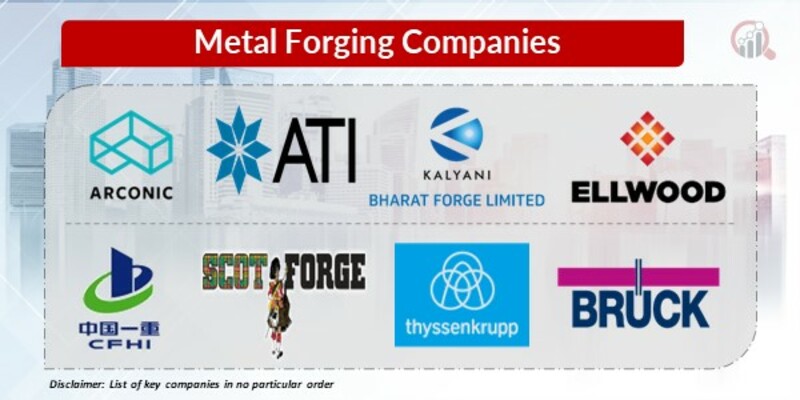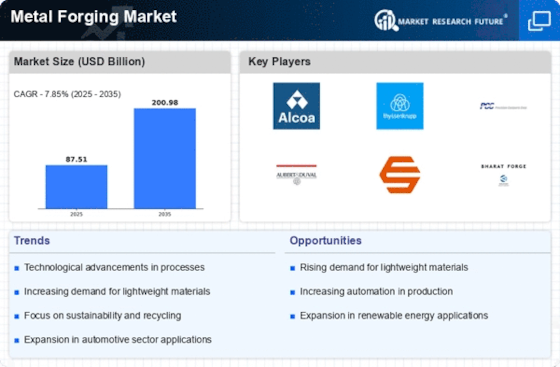Top Industry Leaders in the Metal Forging Market
 The global metal forging market is a dynamic and competitive space, fueled by the demand for high-strength, lightweight components across various industries. This report delves into the strategies adopted by key players, factors influencing market share, recent industry news, and a comprehensive summary of the market, including noteworthy developments.
The global metal forging market is a dynamic and competitive space, fueled by the demand for high-strength, lightweight components across various industries. This report delves into the strategies adopted by key players, factors influencing market share, recent industry news, and a comprehensive summary of the market, including noteworthy developments.
Strategies for Market Domination:
-
Product Diversification: Leading players are expanding their offerings beyond traditional forgings to include advanced products like near-net-shape forgings and precision components. This caters to the rising demand for lightweight and fuel-efficient solutions in industries like aerospace and automotive. -
Technological Advancements: Investing in automation, robotics, and digitalization is crucial for enhancing efficiency, reducing costs, and improving product quality. Companies are adopting technologies like AI-powered process optimization and predictive maintenance to gain a competitive edge. -
Geographic Expansion: Established players are venturing into emerging markets like China and India, which offer significant growth potential due to their burgeoning industrial sectors. This involves establishing local manufacturing facilities and forging strategic partnerships with regional players. -
Vertical Integration: Some companies are integrating backward into raw material sourcing or forward into downstream finishing processes. This provides them with greater control over the supply chain and improves profit margins. -
Sustainability Focus: Environmental concerns are driving the adoption of sustainable forging practices, such as energy-efficient equipment and recycled materials. This resonates with environmentally conscious customers and opens up new market opportunities.
Factors Shaping Market Share:
-
Cost Competitiveness: Price remains a critical factor, particularly in mature markets. Companies are optimizing production processes and negotiating favorable raw material deals to maintain cost competitiveness. -
Quality and Reliability: Forged components are often used in critical applications, demanding high standards of quality and reliability. Companies with established track records and robust quality control systems attract premium customers. -
Innovation and R&D: Continuous innovation in forging techniques and materials is essential for staying ahead of the curve. Companies investing in R&D are better positioned to develop new products and meet evolving customer needs. -
Customer Relationships: Building strong relationships with key customers in industries like aerospace, defense, and energy is crucial for securing long-term contracts and market share.
Key Players
- Arconic Corp.
- ATI
- Bharat Forge Ltd.
- Ellwood Group Inc.
- China First Heavy Industries
- Scot Forge
- Thyssenkrupp Business Area Components Technology
- Bruck GmbH
- Nippon Steel Corp.
- Precision Castparts Corp.
- Kovárna Viva
- Larsen & Toubro Ltd.
- Japan Casting & Forging Corp
Recent Developments :
September 2023: Japan's Aichi Steel develops a new high-strength aluminum forging alloy for aerospace applications, highlighting the industry's focus on material innovation.
October 2023: The United States Department of Defense awards a $1 billion contract to American Axle and Manufacturing for the production of military vehicle components, boosting the domestic forging industry.
November 2023: A consortium of European forging companies launches a collaborative research project on additive manufacturing for forgings, exploring the potential for hybrid manufacturing techniques.











